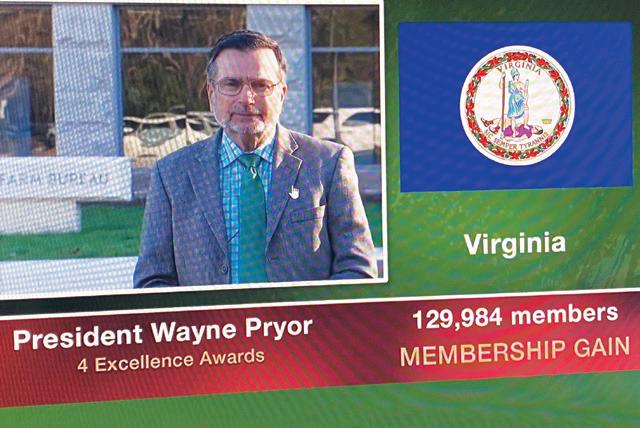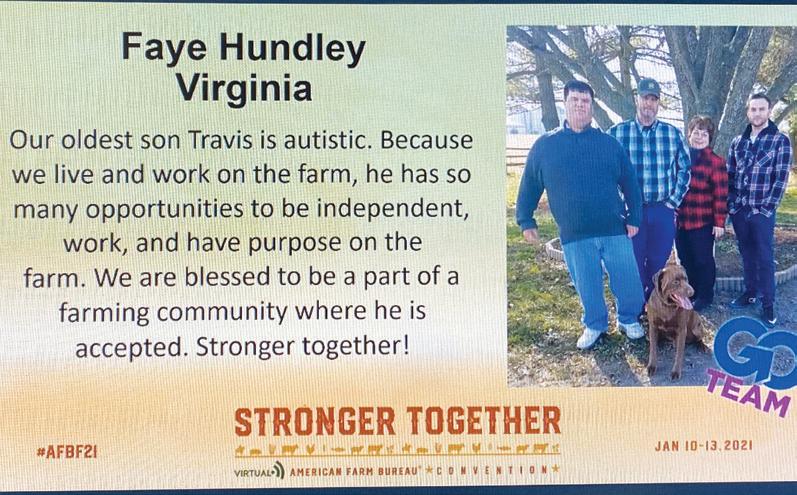
9 minute read
Virtual AFBF convention provides real content
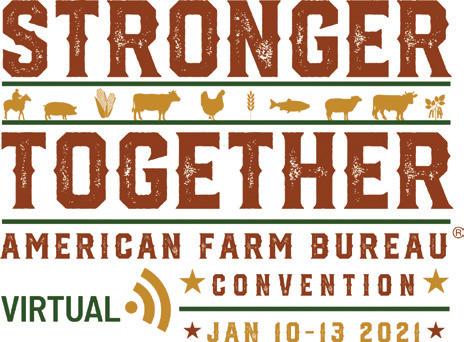
AFBF President Zippy Duvall addressed conference attendees from his Georgia farm.
Virtual AFBF convention full of the normal events, competitions
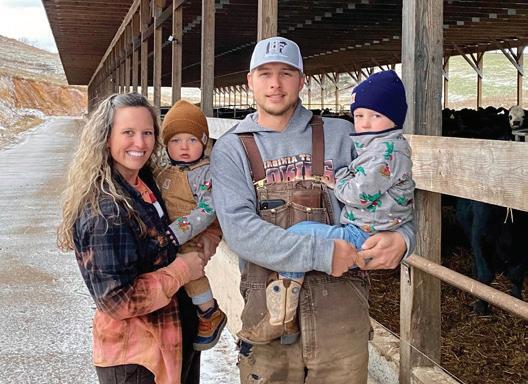
It may have been held virtually, but the 102nd American Farm Bureau Federation convention didn’t lack any actual content, recognitions or accomplishments.
During the Jan. 10-13 convention, Virginia Farm Bureau Federation received AFBF’s Pinnacle Award, the highest honor a state Farm Bureau can be awarded for program and membership achievement. VFBF also received AFBF Awards of Excellence for advocacy; engagement and outreach; leadership and business development; and membership value.
AFBF President Zippy Duvall said this year’s theme of “Stronger Together” was exemplified by the state Farm Bureaus’ collective contribution of $5.4 million in donations and 1.4 million pounds of food to local food banks and pandemic relief programs. The VFBF Women’s Leadership Committee-led PB&J food collection contributed to this effort. County Farm Bureau women’s committees collected a cumulative 4,306 pounds of food and $3,367 in monetary donations.
“Farm Bureau has always stepped up to help our communities, especially in times of disaster and crisis, and this was no exception,” Duvall said during the convention’s opening session. “Throughout the pandemic, Farm Bureau has been there, supporting farmers and ranchers, giving back to communities, providing assurance that our food supply is strong and ensuring America’s pantries are stocked. I’m so proud of the countless acts of kindness and compassion by our Farm Bureau family who gave their time and resources to make life a little better for their neighbors.”
He added that although 2020 was a difficult year, one of the silver linings was holding the convention virtually. The change made it possible for members who had never traveled to the event to participate.
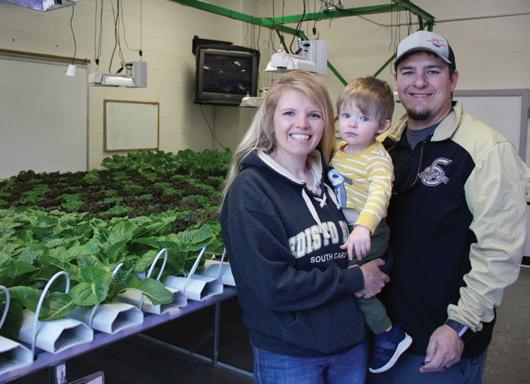
Virginia young farmers rank among top national competitors
Virginia was well-represented in the 2021 AFBF Young Farmers & Ranchers competitions, held during the virtual convention.
Matthew and Shelbie Heldreth of Wythe County took third place in the AFBF Young Farmers & Ranchers Achievement Award program; Jonathan and Kelsey Grimes of Wythe County placed fourth in the AFBF Excellence in Agriculture Award program; and Jacob Gilley of Orange County competed in the national Discussion Meet contest.
The Achievement Award honors young farmers who are successful in production agriculture and provide leadership on and off the farm. The Heldreths manage a 1,200-acre beef cattle operation at Heldreth Farms in Rural Retreat. Matthew serves as chairman of the Wythe County Farm Bureau Young Farmers Committee, and Shelbie serves on the county Farm Bureau’s Women’s Committee.
“There was some very good competition, so we were just excited to be in the top 10 nationally. Coming in third is a once-in-a-lifetime achievement,” Matthew Heldreth said after the winners were announced.
The Excellence in Agriculture Award recognizes individuals for involvement in agriculture, leadership ability and involvement and participation in Farm Bureau and other organizations.
Jonathan Grimes is an agriculture education teacher and FFA advisor at Fort Chiswell High School in Wythe County, and Kelsey Grimes is a Virginia Cooperative Extension 4-H agent. The Grimeses represent the New River Valley region on the VFBF Young Farmers Committee, and have been VFBF Excellence in Agriculture Award finalists since 2017. “It was our goal to make it to the top 10, and this was an opportunity to represent Virginia well in the top four,” Jonathan said of the award.
THE GRIMESES THE HELDRETHS
Gilley took part in two rounds of the AFBF Discussion Meet, designed to simulate a committee meeting in which discussion and active participation are expected from each contestant. He is vice president of the Orange County Farm Bureau, and he and his wife, Jennifer, serve on the VFBF Young Farmers Committee.
WORKSHOPS HELP EDUCATE, ADVOCATE AND PROGNOSTICATE
A variety of workshops and panel discussions were held throughout the AFBF virtual annual convention. Some were live-streamed, while others could be accessed any time during the event and for several weeks after.
Rural mental health workshop reminds farmers ‘It’s OK to not be OK’
Depressed farm economies, weather disasters and the coronavirus pandemic have exacerbated farm-related stress. And studies show there is increased risk for suicide, substance use disorder and depression among U.S. farmers and rural residents.
Agriculturalists discussed these issues Jan. 12 during a workshop titled “Farm State of Mind—Responding to the Challenges of Rural Mental Health.”
A Morning Consult poll conducted among 2,000 rural adults in December 2020 on behalf of AFBF found that 66% of farmers and farmworkers said COVID-19 had impacted their mental health. More than half said they are experiencing more mental health challenges than they were a year ago.
Farm blogger Meredith Bernard of This Farm Wife Inc. in North Carolina said farmers are high-stakes gamblers.
“We don’t buy lottery tickets, but we buy cows and we plant crops,” she said. “Every day feels like it’s a gamble.”
That uncertainty, plus the pressure to sustain a farm legacy for the next generation, causes unrelenting stress.
Panelist Randy Roecker said he knows that pressure well. The Wisconsin dairyman owns the farm his grandfather started in the ‘30s. He has struggled with farm stress and depression himself, and discussed warning signs: withdrawn demeanor, unkempt appearance, weight loss, irritability and exhaustion.
“This is a subject we have to talk about,” Roecker said, discussing efforts in his community to combat the crisis. “It’s OK to not be OK.”
Rural voices are key to broadband expansion
Increased government funding and infrastructure improvements have facilitated expansions of broadband services in rural America, though industry experts said additional advancements are required.
“Today, farmers who can be the most efficient with their time and can best use available resources and data are the ones who are going to be successful,” Jackie Mundt, a cow-calf and grain producer from Preston, Kansas, noted during the Jan. 12 “Staying Connected in a Virtual World” panel discussion.
According to the Federal Communications Commission’s 2020 broadband deployment report, 22.3% of rural Americans lack broadband services, which panelists concurred is detrimental to some farmers and their communities. “For those of us without [broadband], it’s incredibly frustrating,” Mundt shared. “This is an issue that’s standing between us and our livelihoods.”
She noted that she can’t utilize advanced farming technology that would improve efficiency. There is fiber-optic cable running beneath her land, but she can’t tap into it.
The location of the fiber-optic cable on Mundt’s farm on coverage maps falsely indicates that a broadband connection is available. With the passing of the U.S. Broadband DATA Act, which was signed into law in March 2020, consumers can challenge the accuracy of broadband data and coverage maps.
Gov. Ralph Northam announced Jan. 26 more than $29.6 million will be invested toward broadband expansion across 11 Virginia localities to help bridge the digital divide. The Virginia Telecommunication Initiative grant funding will connect more than 11,700 households, businesses and other institutions.
Agricultural economic outlook tied to pricing and trade agreements
Commodity prices, COVID-19 and trade agreements are three of the top subjects shaping agriculture this year.
During the “2021 Farm Economy Outlook” workshop, AFBF livestock economist Michael Nepveux said, “China is the big elephant in the room.” Before the swine flu reduced China’s hog herds in 2018, the country accounted for half of the world’s production and consumption of pork, he noted.
Since then, U.S. pork, beef and poultry exports to China have not only rebounded, but also experienced significant increases in 2020. Nepveux said it’s uncertain whether those exports will continue to increase.
Dr. John Newton, AFBF chief economist, said that under the Phase One trade agreement with China, $22.5 billion in U.S. agricultural products were exported in 2020. He expects that figure to reach more than $40 billion.
But the unknowns regarding trade include President-elect Biden’s views on trade with China, and whether the U.S. will rejoin the Trans-Pacific Partnership. Newton said that when former President Obama negotiated the TPP, it stood to boost net farm income by $4 billion.
Diversification key to pivoting farm operations
During a Jan. 12 panel discussion, Matt Cunningham, owner of Rustic
Brew Farm in Ohio, said his family’s farm was shrinking due to land development, low commodity prices and competition from larger farms. Worried about the farm’s future, “I decided to look for something a little more profitable.”
Cunningham was already growing corn, soybeans and wheat, so he tapped into the popular craft beer market by selling malting barley to local brewers.
He and other speakers asserted that change and diversification are ways to ensure farms will continue for future generations.
The workshop also emphasized the importance of connecting to consumers with a social media presence—a requirement in today’s marketplace.
That’s something Virginia farmer Mike Cullipher, a member of the VFBF Specialty Crops Advisory Committee and co-owner of Cullipher Farms in Virginia Beach, knows well.
While Cullipher Farms had a website and social media accounts, Cullipher didn’t have an online ordering platform for the farm’s retail market. When the pandemic hit, he had to pivot.
Cullipher Farms kept revenue flowing by allowing customers to order online and pick up their purchases in a drive-thru arrangement at the farm, using social media to keep customers informed.
Experts predict a bright outlook for Va. beef cattle market
Cattlemen and beef consumers went on a roller-coaster ride in 2020, but the outlook for beef cattle production and consumption is looking brighter this year.
Industry experts at a Jan. 12 workshop discussed how the COVID-19 pandemic sent consumer prices skyrocketing as farm prices plummeted. But both prices returned to near previous-year levels quicker than expected.
By the end of 2020, “we were able adjust and get back over” the pace set the year before for processing cattle and hogs, shared AFBF economist Michael Nepveux.
He noted that in early May, American beef production dropped 34% below the same time in 2019 due to panic food buying and health concerns in processing plants. In November 2020, away-from-home food sales totaled $50 billion, a 20% decline from 2019.
Beef production last year was near record levels, and a 1% to 2% production decline is expected in 2021. A slightly smaller cattle supply is welcome news to producers and feedlots who lost money when they had to feed cattle for several extra weeks last spring.
“The whole industry pivoted in just a few months to adapt to major changes in the overall food supply network. Now that everyone has been through that, we don’t expect that problem to happen again,” said Margaret Ann Smith, a Rockbridge County cattle broker and member of the VFBF Livestock Advisory Committee.

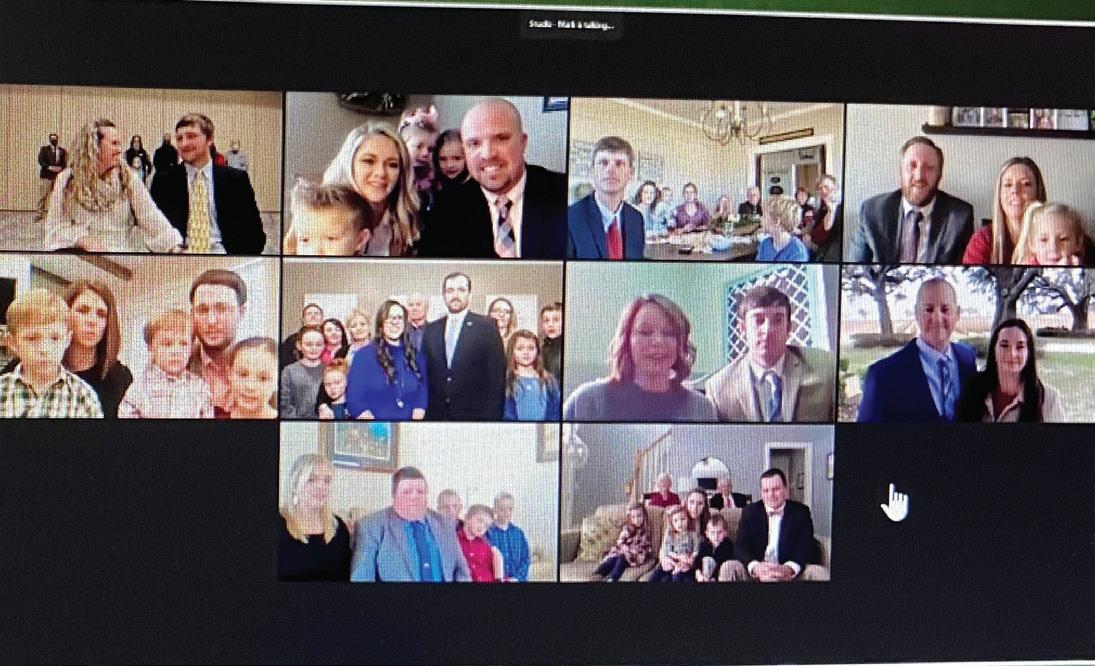
Jacob Gilley, top center photo above, competed in the AFBF Discussion Meet. To the left, the Heldreths, who won 3rd place in the AFBF Achievement Award, are shown in the top left panel. VFBF President Wayne Pryor and VFBF Women’s Leadership Committee Chair Faye Hundley also were recognized during the virtual AFBF convention.
